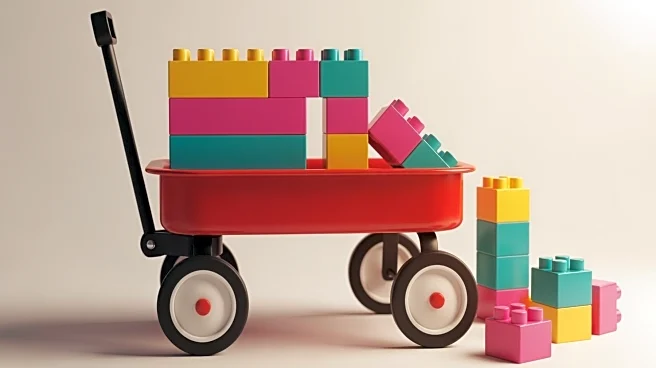What's Happening?
Mattel, the renowned toy manufacturer known for its iconic brands like Barbie and Hot Wheels, reported third-quarter earnings that fell short of Wall Street expectations. The company announced an adjusted
earnings per share of 89 cents, missing the anticipated $1.07. Revenue also declined to $1.74 billion, below the expected $1.83 billion. This marks the first time in three quarters that Mattel has missed both earnings and revenue forecasts. The decline is attributed to ongoing global tariffs impacting sales in North America, where sales fell by 12%. Despite these challenges, Mattel's CEO Ynon Kreiz emphasized the company's strong business fundamentals and noted a significant acceleration in U.S. retailer orders at the start of the fourth quarter. International sales, however, saw a 3% increase, and the company is focusing on expanding its entertainment offerings and leveraging new technology.
Why It's Important?
The earnings miss highlights the broader challenges faced by the toy industry, particularly in North America, where tariffs have increased input costs. Mattel's performance is a bellwether for the sector, indicating potential difficulties for other toy manufacturers. The company's strategic shift towards entertainment and technology partnerships, such as the collaboration with Hasbro and Netflix, reflects an industry trend towards diversification and innovation to offset traditional sales declines. This move could potentially open new revenue streams and mitigate the impact of tariffs. Stakeholders, including investors and retailers, are closely watching how these strategies will play out in the competitive toy market.
What's Next?
Mattel has issued full-year guidance, projecting net sales growth between 1% and 3% and earnings per share between $1.54 and $1.66. The company is also preparing to launch new products in collaboration with Hasbro and Netflix, aiming to capitalize on the success of the 'KPop Demon Hunters' movie. These initiatives are expected to boost sales in the coming quarters. Additionally, Mattel's focus on reducing its reliance on Chinese manufacturing could help mitigate tariff impacts. The company's performance in the upcoming holiday season will be crucial in determining the effectiveness of its strategic adjustments.









